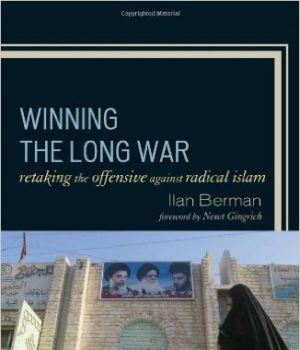Retaking the Offensive Against Radical Islam
Three years after the September 11, 2001 attacks, the National Commission on Terrorist Attacks Upon the United States, better known as the “9/11 Commission,” famously concluded that the most important failure leading up to the attacks was “one of imagination…. We do not believe leaders understood the gravity of the threat,” the authors stated.
Unfortunately, a decade after the fateful attacks, America’s leaders still fail to grasp the severity of the terrorist threat. The Obama administration continues to pursue the Guantanamo Bay detention facility’s closure even after several terrorist scares over the last 24 months and Congressional restrictions on transferring detainees to U.S. soil. Moreover, while the administration recently announced it would resume military tribunals at Guantanamo Bay, it has yet to officially change plans to try 9/11 mastermind Khalid Sheikh Mohammed and his fellow co-conspirators in U.S. civilian courts. As late as March 2011, the administration emphasized its support for civilian trials and confirmed that it will seek to repeal the law blocking the transfer of detainees to the United States.
In his latest book, Winning the Long War, author Ilan Berman, vice president of the American Foreign Policy Council, answers the 9/11 Commission’s call for imagination and understanding. In this succinct and accessible book, Berman sets himself apart from other experts writing on the subject by not only outlining the major gaps in the current American counterterrorism strategy, but by also offering creative, real-world solutions to filling those holes and retaking the offensive in what Berman calls “the defining struggle of our time.”
The first step is to define the enemy. Too many policymakers focus solely on al-Qaeda as America’s Enemy Number One. According to Berman, this is shortsighted. America’s leaders must broaden their notion of “the enemy” to encompass the small groups and individuals who are not affiliated with al-Qaeda yet look to the terrorist group for inspiration. According to the U.S. State Department, the Islamic Republic of Iran is the “most active state sponsor of terrorism” with its support for proxy organizations such as Hezbollah, Hamas, and the Palestinian Islamic Jihad. No longer should al-Qaeda and the Taliban be the United States’ only target; they are simply two actors among many that are interested in harming American citizens and soldiers.
That Berman highlights Iran as an enemy from the outset is crucial at a time when the White House continues to fruitlessly engage with the regime in Tehran over its nuclear program. Indeed, the United States has failed to develop a solution to Iran’s increasingly hostile actions. While former President Bush was right to call Iran an enemy when he included the state in his ‘axis of evil’ list during the 2002 State of the Union address, his administration did little to alter the regime’s behavior. Nor did the administration make significant headway with support for those in Iran’s opposition.
Although President Obama passed an important round of sanctions against Iran both in the UN and the U.S. in 2010, analysts note they lack bite. The current administration stood aside during the demonstrations in the wake of the fraudulent June 2009 Iranian elections, preferring to keep open the channels of official diplomatic engagement rather than support the Green Movement. Instead of reaching out to the Iranian people, the White House continued to offer its outstretched hand to the regime despite the closed fist that greeted it, reinforcing the unfortunate message that rogue behavior will not only be tolerated but will earn Middle East despots a seat at the table.
Indeed, there is reason to believe the United States’ leadership fails to fully grasp how war is waged in the 21st century. Gone are the days where battles were fought solely on the military battlefield. “The principal battlefields in the years ahead,” Berman writes, will be the “nonkinetic” areas—that of “ideology, strategic influence, economic warfare, international law, and democracy promotion”—areas in which the “United States can and should be doing much more.”
For example, much to America’s detriment, nearly ten years after September 11 the United States has yet to create and implement a coherent public diplomacy policy to communicate with the world’s Muslim populations and discredit terrorist groups’ ideologies. This should come as a surprise considering the importance the U.S. once placed on strategically communicating to countries under the Soviet bloc during the Cold War with operations such as Voice of America and Radio Free Europe/Radio Liberty—efforts credited as playing a key role in winning the war for the West.
And yet, as far back as 2002, Osama bin Laden recognized that the media would be one of the “strongest methods” for promoting al-Qaeda’s objectives in the battle for Muslim “hearts and minds.” Today, al-Qaeda runs al-Sahab—a dedicated media wing, the Global Islamic Media Front—a mouthpiece for training and operations, and a network of at least 50 websites that spread its jihadist message and teach wannabe terrorists deadly tactics such as how to build homemade bombs. Hamas, Hezbollah, and Iran also operate similar communications wings.
To its credit, the U.S. government has created a select few structures to combat threatening ideologies, such as Radio Sawa and the Arabic TV station, Alhurra. But policymakers are largely stuck in “Cold War thinking about the need to demonstrate the superiority of American values.” Unlike those living under the Soviet bloc, the Muslim world isn’t yearning to be liberated by the U.S.—in fact, as the recent uprisings in Tunisia, Egypt, Yemen, Bahrain, and beyond illustrate, it desires liberation from the tyrannies that Washington supports to various degrees. Instead of pushing American values, Berman advises, Washington’s goal should be to coax those Muslim “undecided voters” away from the hardcore elements and appeal to their interests as the “enemy of their enemy;” it should be to work “within the world of Islam” to dilute the appeal of Muslim extremists, de-legitimize their message, and aggravate the fissures between them and the societies in which they operate.
The battle the United States faces today is very different from those that came before. Unlike the Cold War when “Moscow’s leaders…understood the necessity for coexistence on an economic and diplomatic level,” Islamic extremists believe their conflict with the West is one “in which no quarter can be given or compromise reached” and “reject outright the legitimacy of modern international law and politics.” As legal scholar Andrew McCarthy explained, global jihadist networks turn the rules of law enshrined in the Geneva Conventions “on its head… Their modus operandi is to endanger civilians, directly by mass-destruction attacks and indirectly by blending into the population, complicating reprisals.”
One man’s terrorist is another man’s freedom fighter, as the saying goes. According to international law, however, this statement could not be further from the truth. Under the Hague Conventions, in order to be considered a legal combatant, fighters must follow a defined chain of command, wear an emblem visible at a distance, carry arms openly, and obey the laws of war—most notably, by not targeting civilians—all rules the Islamic extremists break. How does a signatory of such wartime rules fight against non-signatories that use these illegal tactics? This is an issue Israel has struggled with for decades.
The Bush administration decided that combatants who do not adhere to international wartime conventions standards do not deserve those conventions’ protections. Thus, the president utilized detention centers, coercive interrogations, and military tribunals to prosecute militants captured on the battlefield and glean crucial information from them. The Obama White House, for ideological reasons, made rolling back these Bush-era policies a priority. But by closing Gitmo, renouncing “coercive interrogations,” announcing a trial for Khalid Sheikh Mohammed in New York City and then refusing to comment on the matter, the administration has more outlined what it won’t do rather than take a leading role in shaping the international legal system in this new era with this “new kind of war.”
As leader of the free world and global Islamic extremism’s main adversary, it is up to the United States to lead the international community in adapting the established rules of war to the new way war is waged in the 21st century. The U.S. needs to retake the offensive in the fight against radical Islam.
During his confirmation hearing in 1993, incoming Director of Central Intelligence James Woolsey warned of the Cold War’s end, “We have slain a large dragon…. But we live now in a jungle filled with a bewildering variety of poisonous snakes. And in many ways, the dragon was easier to keep track of.” His words ring as true today as they did then. Since 9/11, Washington has struggled against individual jihadis and small terrorist networks while wading through muddy legal and diplomatic waters in its effort to ensure its citizens’ safety and security.
Although the dragon was easier to track, the United States can still defeat today’s poisonous snakes just the same. Ilan Berman’s Winning the Long War provides a practical blueprint that should be required reading for policymakers and concerned Americans alike.
Samara Greenberg is a research associate at the Jewish Policy Center and assistant editor of inFocus Quarterly.






